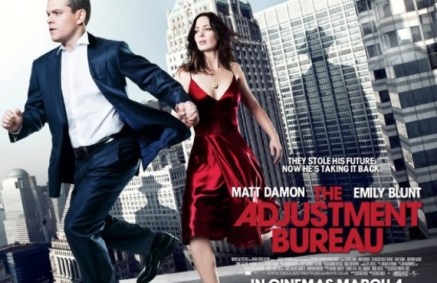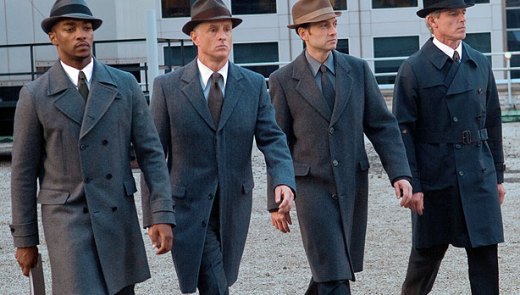Review by C.J. Bunce
As Hollywood slowly realizes that Philip K. Dick wrote forty-four novels and 121 short stories, you’ve got to wonder what took them so long. The best of his works are his short stories. In a parallel universe you could see each story as its own episode of The Twilight Zone. It’s probably why more of his short stories have made it to the silver screen than his novels (not to knock any of his novels).
The most recent addition to the PKD stories adapted for the screen is The Adjustment Bureau. And it may be the best yet. And yes, I am including Blade Runner.
The Adjustment Bureau pulls ideas from PDK’s short story, “The Adjustment Team.” The film is good enough and close enough to the original story that you easily feel both the story and movie exist in the same place. More so than PKD’s complete novels or stories, it is his ideas that still amaze readers and audiences.
In “The Adjustment Team” and The Adjustment Bureau, there are… “others” on this Earth. Not aliens, but akin to angels. They are members of the Adjustment Bureau, which in turn works for the Chairman, presumably a manifestation of God, but we don’t need to get into that detail to believe what is happening. Also, the Bureau–the visitors who are always here–are not frightening aliens or strange apparations like we have seen in The Matrix or They Live. Very easily this film may not be science fiction at all. In that concept, this is a very PKD story, as he often toyed with religion in a very serious way and challenged the religious world around us.
There is a Plan–one best timeline for all events–and when circumstances show that the Plan is straying, the Adjustment Bureau is sent in to do what is necessary to get the Plan back on track. In the short story, that means a dog needs to bark on queue. In the movie it means the protagonist needs to spill his coffee at a certain moment, or he will end up in a chance encounter with the girl of his dreams. There lies the rub, for our protagonist is a truly good guy, a good Senator on a path to the White House, compared to other sci-fi senators that usually have ulterior motives, like we saw in The Dead Zone. If this senator ends up with the girl of his dreams, the woman he is destined for, he will become content, and will lose the desire to complete his political path. Yet there is no choice when the Plan is involved. So what is he supposed to do?
As with PKD’s story, the believability of the timeline science and the ability to interfere with chance meetings, coupled with fate and destiny, make the movie nicely high concept for a not-so-elaborate production. It is also not epic or overblown–it doesn’t need to be; what is at stake is the love of two people for each other. The treatment of that reflects a similar treatment in an equally great PKD story adapted for film, Paycheck. You also don’t see a lot of sci-fi that would make a great first-date flick.
I liked Matt Damon’s character and performance here over any other to date. Emily Blunt is perfect as the target of his affections. Plenty of cameos are also fun, including Jon Stewart, James Carville, Mary Matalin, and Mayor Michael Bloomberg playing themselves. The very best performance and role comes from an unusual character that we get to know and appreciate, Harry Mitchell, played by Anthony Mackey. Terence Stamp (Zod from Superman I and II) as Thompson and John Slattery as Richardson are also perfectly cast as members of the Bureau.
The world of the Bureau is not overly complicated and amazingly easy to fall into. The themes of fate, happenstance and missed opportunity have rarely seen such a nice treatment in film. The lack of any need for special effects, overly long action scenes and irrelevant tangents results in a very polished final film that is all about story. For such a great PKD-inspired film that remains true to PKD’s original world building, for great performances, entertaining twists, and a fun overall movie, The Adjustment Bureau gets 5 of 5 stars.







Although I’m not as familiar with Philip K. Dick’s works as is Mr. Bunce, the discussion of The Adjustment Bureau reminded me of the sci-fi classic “To Say Nothing of The Dog.”
In that story, a group of time travelers is concerned with “slippage and incongruities” caused by seemingly inconsequential events…not unlike chaos theory. Perhaps it’s not necessary that a dog bark on cue or that a protagonist spill coffee at a specific moment, however, seemingly random events have consequences. Many of them are not good. Hence, care must be taken to not disturb the time line. Or in the case of The Adjustment Bureau…the Plan.
There is a danger, of course, in turning the “time-space continuum” plot device into an overused substitute for creative storytelling. But it appears that The Adjustment Bureau avoids that risk
Mr. Bunce makes a compelling case for seeing this contemporary adaptation of a PKD short story.